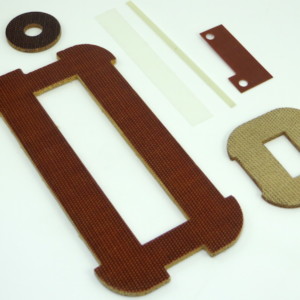Phenolic, a composite resin material made from a combination of phenol and aldehyde, is a rigid material used in a wide range of consumer fitting applications. Because phenolic is easy to manufacture and relatively affordable, it is also frequently used as an acrylic alternative, as a binder, and as an insulator.
Phenolic’s characteristics and properties vary depending on the type of aldehyde used, although formaldehyde is most common. To transform the aldehyde and phenol mixture into a phenolic sheet, paper, glass or cloth is impregnated with the synthetic mixture, then layered and pressed together using heat and pressure. As a result of the heat and pressure, polymerization occurs and the resin reacts with the paper, cloth, or glass to produce a hard, dense sheet of phenolic plastic.
Consisting of electrical grade epoxy resin systems combined with a variety of glass fabric substrates, glass epoxy products come in low- and high-temperature versions. Low-temperature thermoset epoxy/glass materials offer good chemical resistance and electrical properties under dry and humid conditions. Some systems are flame retardant and meet the Underwriters Laboratories Flammability Class, V-0. They also feature high flexural, impact, and bond strength at temperatures up to 130°C. These fiberglass composite materials are suitable for a variety of structural, electronic, and electrical applications.
High-temperature fiberglass epoxy resin systems offer superior mechanical strength and insulative properties over a wider temperature range. These products feature high mechanical strength at continuous operating temperatures up to 180°C in mechanical applications. Several standard grades can handle temperatures much higher than 180°C for short periods of time. At elevated temperatures up to 155°C, epoxy composites retain at least 50 percent of their room temperature flexural strength. Several types meet NEMA G-11 requirements, and the materials can also be produced on any glass style for applications that do not require NEMA G-11. Applications include solder pallets, corona dissipation, rotor slot cell insulation, and structural applications at elevated temperatures.
Benefits of Phenolic/ Melamine / Glass Epoxy
Phenolic sheets are easy to machine and operate with less noise than metal in numerous gear and bearing-type applications. In addition, they do not spark when struck, so they can be used in explosion-proof environments. These structural and electrical insulation materials are also less abrasive than fiberglass options in wear applications. Phenolic/canvas composites can be used to make a variety of parts, including gears, pulleys, rollers, and guides. In the phenolic/linen product line, grades include bleached linen to enhance moisture resistance, electrical insulation, and other properties. The resin systems can be modified in various ways to suit requirements, including the addition of lubricants that reduce wear. Phenolic/linen products offer a lower coefficient of thermal expansion than thermoplastic materials, as well as more strength and heat resistance than all but the most expensive thermoplastics. Applications include small gears, pulleys, rollers, guides, and other parts that are more intricate than those made with canvas grades.
Melamine laminates are used to create a variety of handsome multi-colored signs, plaques, and nameplates that do not melt like competitive thermoplastic materials – an especially important attribute for fire safety in public buildings. A melamine resin combined with fine weave cotton (linen) materials are also available. These high performance materials are harder than phenolic linen materials and offers superior arc resistance. Although designed for arc-resistant switch bases and contact holders, this white, high performance material is sometimes used for decorative parts.
Die-Cut Products offers Phenolic, Melamine, and Glass Epoxy materials such as but not limited to:
- G10-FR4 – Glass Epoxy
- G11 – High Temperature Glass Epoxy
- CE – Canvas Phenolic
- LE – Linen Phenolic
- G7 – Glass Silicone
- G9 – Glass Melamine
- GP0-3 – Glass Polyester
- XXX – Paper Phenolic
If you have a need for a specialty grade version not listed here please let us know, and we’ll be happy to assist you.

Applications & Industries
Common applications for these materials include:
- Switchboard panels
- Arc barriers
- Structural electrical parts
- Specialty terminal blocks and circuit breaker components
- Insulating washers, bushings, rollers, & sleeves
- Switch bases and panelboards
- Critical High-Heat Parts
- Intricate machined parts
- Radio components
- Fine gears and pinions
- Spacers, bushings and rollers
- Gears, pulleys, and sheaves
- Terminal Boards
PHENOLIC / MELAMINE / GLASS EPOXY products are regularly utilized in the following industries:
- Medical & Healthcare
- Aerospace & Marine
- Military and Defense Equipment
- Fluid Processing Equipment
- Construction Equipment
- Mining Equipment
- Architectural
- Material Handling
- Packaging
- Compressors
- Petrochemical
- HVAC
Please contact us today!
Products
Metallic
Non-Metallic
Custom Shims
Gaskets
Materials
Metallic
Rubber & Sponge
Plastic & Foam
Cork & Cork-Rubber
Fiber & Paper
Felt
Adhesives
Specialty Gasket Materials
Capabilities
Die Cutting
Metal Stamping & Fabrication
Shim Manufacturing
Laser Cutting
Water Jet Cutting
PPE – Face Shields
Wire EDM
Prototypingvetica, sans-serif; font-size: 12px; line-height: normal;”>